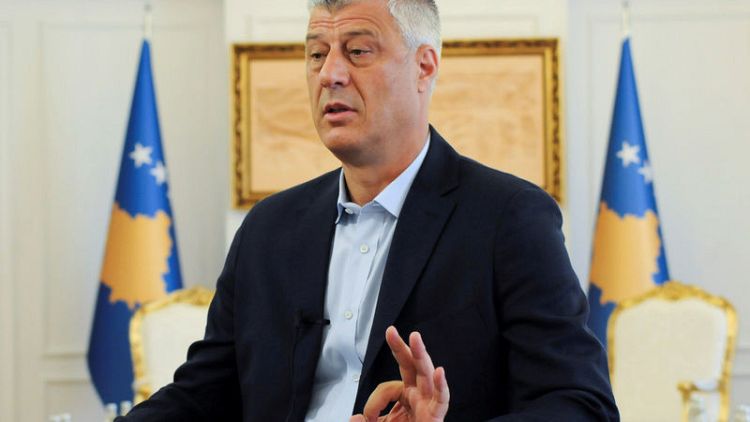By Robin Emmott
BRUSSELS (Reuters) - The presidents of Serbia and Kosovo abruptly called off a face-to-face meeting in Brussels on Friday, deflating hopes of a deal involving a land swap that could allow both nations to move towards EU membership.
Kosovo's President Hashim Thaci was due to discuss the swap plan with his Serbian counterpart Aleksandar Vucic for the first time in talks brokered by the EU's top diplomat Federica Mogherini.
But both men refused to speak to each other moments before their meeting was due to start at the EU's headquarters in Brussels, diplomats said, leaving Mogherini to meet them separately several times during the day to keep talks alive.
"It went wrong today, they did not meet, they indulged in some drama instead," said one EU diplomat briefed on the talks, although it was not immediately clear what caused the breakdown.
"Difficulties remain," Mogherini said in a statement, although she said she would seek another meeting with the two presidents later this month.
Vucic had planned to visit Kosovo this weekend and hold a rally, but a Serbian government official said he had now cancelled the visit. Vucic's office still has not issued a statement saying if the visit is cancelled.
The failure to meet in person partly reflects a backlash in both Kosovo and Serbia to the land swap plan, as well as some resistance in Germany, the EU diplomat said.
Belgrade and Pristina have both raised the idea of redrawing their border.
EU, U.S. SUPPORT
Kosovo, which has a population of 1.8 million is mainly ethnic Albanian, declared independence from Belgrade in 2008, almost a decade after NATO air strikes ousted Serbian forces and halted a crackdown on ethnic Albanians during a counter-insurgency.
It is now recognised by more than 100 nations but not by Serbia, Russia and five EU states.
Politicians and analysts in Belgrade say that an agreement allowing Serbia to maintain control over northern Kosovo, in exchange for the Presevo Valley, an ethnic Albanian-populated area in Serbia's south, could be acceptable to both sides.
But Germany warned last week that redrawing Serbia's border with Kosovo would fan ethnic tensions, although the European Union and the United States have said they would abide by a deal if it respected international law.
Kosovo's Thaci had told Reuters on Aug. 14 that he would present his plan to Serbia's Vucic at their meeting in Brussels.
Normalising bilateral relations is a key condition for both Serbia and Kosovo to advance towards their eventual goal of EU membership. The Balkan neighbours agreed in 2013 to resolve all pending issues but have so far made little progress.
(Additional reporting by Aleksandar Vasovic in Belgrade; Editing by Raissa Kasolowsky)
